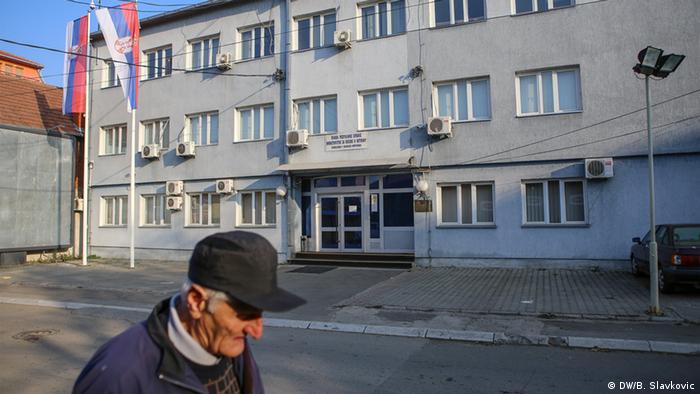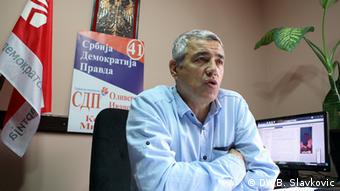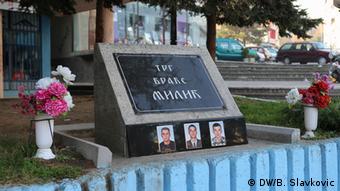Mitrovica is a Kosovan city divided in two: Serbs live in the north, Albanians in the south. It’s the flashpoint for Serb reluctance to be living in a Kosovan state.
Back in the days of socialist Yugoslavia, Mitrovica was a rather prosperous city. On the outskirts of town, the vast Trepeca mines were one of the largest industrial complexes in the country, while Mitrovica itself was home to Albanians, Serbs, Bosnians, Turks and other minorities.
Today, the name Mitrovica is synonymous with division. The Ibar River has become a de facto border since the war in Kosovo ended in 1999, separating a mainly Albanian population in the south from majority Serb North Mitrovica.
On Sunday (17.11.2013), voters in North Mitrovica went to the polls in a repeat election, called after violence and intimidation marred voting in the town earlier this month. The election was seen as crucial for the Brussels agreement – which was signed between Serbia and Kosovo in April – but many of the around 20,000 ethnic Serbs in north Mitrovica are wary of any change to the status quo.
“A huge majority of the people are against any sort of tight connection with Pristina,” says Oliver Ivanovic, who was standing for mayor of North Mitrovica and won enough votes to contest a run-off on December 1. “Pristina is there, we cannot underestimate that fact. We are part of Kosovo as long as Kosovo is part of Serbia.”
Serb resistance
Like Serbia itself, the vast majority of the 40,000 ethnic Serbs spread across the four municipalities of north Kosovo refuse to recognize Kosovo’s independence, which was declared in 2008.
“No Serbs recognize Kosovo independence,” says Ivanovic. “We have to live with this fact, which is not pleasant. [But] because there is no alternative, the Serbs will not leave here.”
Over the past 14 years, North Kosovo has developed in isolation from the rest of the country. Here Serbian flags fly and signs in Cyrillic and English proclaim, “This is Serbia.” A system of parallel structures, funded by Belgrade, provides everything from schools and health to the courts system.
But almost a decade and a half of isolation has taken a toll, too. Cars, many without license plates, clutter up footpaths. With a weak rule of law, lucrative illegal trades have flourished in everything from fuel to firearms.
“Putting law and order on the street means fixing the streets and parking space,” says Ivanovic. “Our fight for improvement in law and order starts with parking. You have to make it clear to people that things are changing. That Mitrovica is changing.”
‘Different people with a different culture’
The division of the town has come at a big social price says Sinisa, an ethnic Serb primary school teacher who didn’t want his surname used: “Before the war the town was organized in a proper way. All the facilities were shared around the town but by dividing the town, now we just have the general hospital and all the other facilities, two stadiums, sports hall, health centre, railway station, everything is in the south.”
But Sinisa has no desire to return to how things were before the conflict: “I don’t want to be integrated. I am satisfied with life here. Yes, my neighbors can come, we can co-operate and work together but at night they go and sleep in their part of town. They are different people, with a different culture.”
Commerce offers the best opportunity to bring Albanians and Serbs together, says Niall Ardill, a former business lecturer in North Mitrovica’s university who recently completed a study on the private sector in north Kosovo.
“The business community is more advanced than the political community,” he says as he stands beside the main bridge connecting north and south Mitrovica. A huge mound of earth and stone has blocked the bridge since 2011, when Kosovo police attempted to take control of border crossings.
No money
Around 30 per cent of companies in the north trade with the rest of Kosovo. But twice as many would like to. “We have found that companies that trade with the south really benefit,” says Ardill.
The main barrier is not politics, it’s capacity: “A lot of the processes and procedures they use might be outdated so that’s something that needs to be looked at from an investor point of view and from an international donor point of view.”
In the mixed north Mitrovica neighborhood of Bosniak Mahala, local shopkeeper Artan Maxhuni, an ethnic Turk, complains that the biggest problem for his clothing business lies with the wider economy.
“The economic situation in Kosovo is bad, really bad,” he says. “Everywhere in Kosovo is bad, not just in Mitrovica, but Mitrovica is especially bad.
“I have Serb customers, no problem, but people have no money.”
Just past the armed Italian police that keep a constant vigil on the bridge over the Ibar, in largely Albanian south Mitrovica, Aferdita Syla, executive director of Community Building Mitrovica, is trying to nurture cross-community links in the divided city.
“In July we brought 40 kids on an activity – 20 from the north, 20 from the south,” Syla remembers. “Their first reaction when they met each other was, ‘Wow, they are normal.’ Because for a long time they had no contact with each other, they thought the other was not human.”
But in a divided city, making connections is easier than keeping them. “They don’t have this daily contact. That is where we are lacking. We have to cross this bridge more.”
This piece originally appeared on Deutsche Welle.


